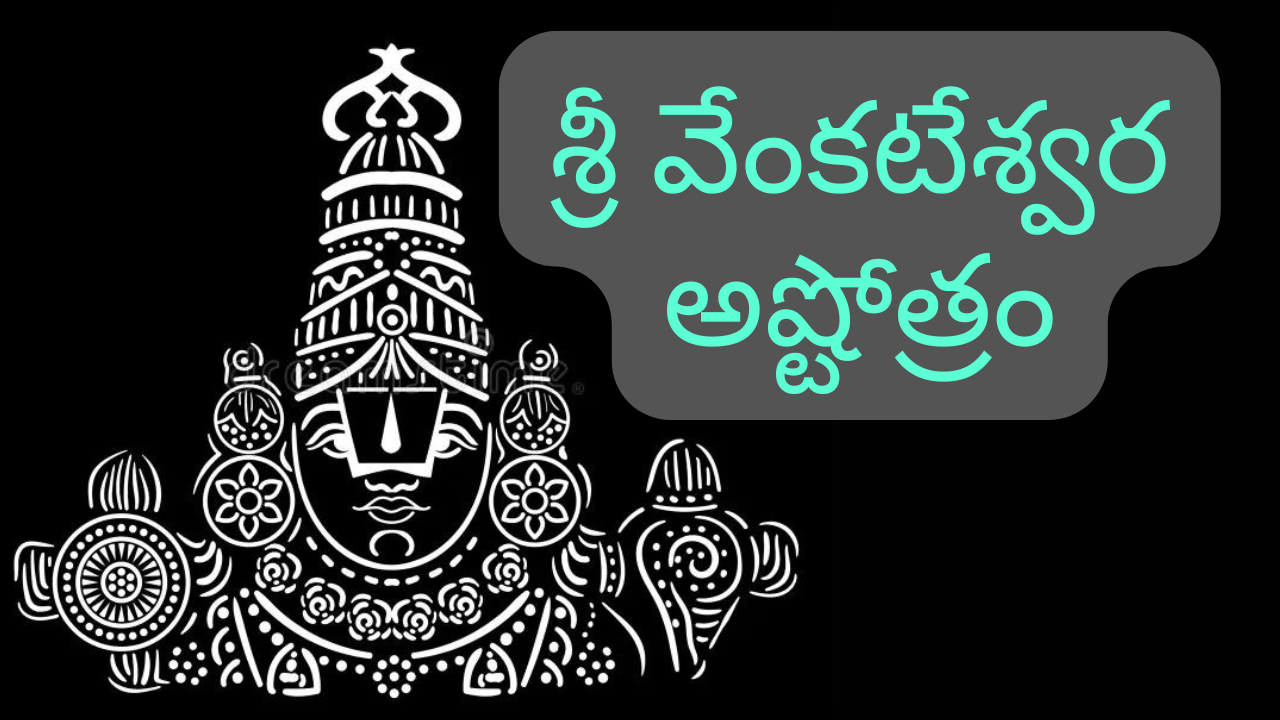Venkateswara Ashtothram in Telugu : The Venkateswara Ashtothram in Telugu is a profound devotional practice that offers numerous spiritual benefits. Through its recitation, devotees can connect with Lord Venkateswara, seek his blessings, and experience personal and spiritual growth.
శ్రీ వేంకటేశ్వర అష్టోత్రం
ఓం శ్రీ వేంకటేశాయ నమః
ఓం శ్రీనివాసాయ నమః
ఓం లక్ష్మీపతయే నమః
ఓం అనామయాయ నమః
ఓం అమృతాశాయ నమః
ఓం జగద్వంద్యాయ నమః
ఓం గోవిందాయ నమః
ఓం శాశ్వతాయ నమః
ఓం ప్రభవే నమః
ఓం శేషాద్రినిలయాయ నమః (10)
ఓం దేవాయ నమః
ఓం కేశవాయ నమః
ఓం మధుసూదనాయ నమః
ఓం అమృతాయ నమః
ఓం మాధవాయ నమః
ఓం కృష్ణాయ నమః
ఓం శ్రీహరయే నమః
ఓం జ్ఞానపంజరాయ నమః
ఓం శ్రీవత్సవక్షసే నమః
ఓం సర్వేశాయ నమః
ఓం గోపాలాయ నమః
ఓం పురుషోత్తమాయ నమః
ఓం గోపీశ్వరాయ నమః
ఓం పరస్మై జ్యోతిషే నమః
ఓం వ్తెకుంఠ పతయే నమః
ఓం అవ్యయాయ నమః
ఓం సుధాతనవే నమః
ఓం యాదవేంద్రాయ నమః
ఓం నిత్య యౌవనరూపవతే నమః
ఓం చతుర్వేదాత్మకాయ నమః (30)
ఓం విష్ణవే నమః
ఓం అచ్యుతాయ నమః
ఓం పద్మినీప్రియాయ నమః
ఓం ధరాపతయే నమః
ఓం సురపతయే నమః
ఓం నిర్మలాయ నమః
ఓం దేవపూజితాయ నమః
ఓం చతుర్భుజాయ నమః
ఓం చక్రధరాయ నమః
ఓం త్రిధామ్నే నమః (40)
ఓం త్రిగుణాశ్రయాయ నమః
ఓం నిర్వికల్పాయ నమః
ఓం నిష్కళంకాయ నమః
ఓం నిరాంతకాయ నమః
ఓం నిరంజనాయ నమః
ఓం విరాభాసాయ నమః
ఓం నిత్యతృప్తాయ నమః
ఓం నిర్గుణాయ నమః
ఓం నిరుపద్రవాయ నమః
ఓం గదాధరాయ నమః (50)
ఓం శార్-ంగపాణయే నమః
ఓం నందకినే నమః
ఓం శంఖధారకాయ నమః
ఓం అనేకమూర్తయే నమః
ఓం అవ్యక్తాయ నమః
ఓం కటిహస్తాయ నమః
ఓం వరప్రదాయ నమః
ఓం అనేకాత్మనే నమః
ఓం దీనబంధవే నమః
ఓం ఆర్తలోకాభయప్రదాయ నమః (60)
ఓం ఆకాశరాజవరదాయ నమః
ఓం యోగిహృత్పద్మమందిరాయ నమః
ఓం దామోదరాయ నమః
ఓం జగత్పాలాయ నమః
ఓం పాపఘ్నాయ నమః
ఓం భక్తవత్సలాయ నమః
ఓం త్రివిక్రమాయ నమః
ఓం శింశుమారాయ నమః
ఓం జటామకుట శోభితాయ నమః
ఓం శంఖమద్యోల్లస-న్మంజుకింకిణ్యాఢ్యకరండకాయ నమః (70)
ఓం నీలమోఘశ్యామ తనవే నమః
ఓం బిల్వపత్రార్చన ప్రియాయ నమః
ఓం జగద్వ్యాపినే నమః
ఓం జగత్కర్త్రే నమః
ఓం జగత్సాక్షిణే నమః
ఓం జగత్పతయే నమః
ఓం చింతితార్థప్రదాయ నమః
ఓం జిష్ణవే నమః
ఓం దాశార్హాయ నమః
ఓం దశరూపవతే నమః (80)
ఓం దేవకీ నందనాయ నమః
ఓం శౌరయే నమః
ఓం హయగ్రీవాయ నమః
ఓం జనార్దనాయ నమః
ఓం కన్యాశ్రవణతారేజ్యాయ నమః
ఓం పీతాంబరధరాయ నమః
ఓం అనఘాయ నమః
ఓం వనమాలినే నమః
ఓం పద్మనాభాయ నమః
ఓం మృగయాసక్త మానసాయ నమః (90)
ఓం అశ్వారూఢాయ నమః
ఓం ఖడ్గధారిణే నమః
ఓం ధనార్జన సముత్సుకాయ నమః
ఓం ఘనసార లసన్మధ్యకస్తూరీ తిలకోజ్జ్వలాయ నమః
ఓం సచ్చితానందరూపాయ నమః
ఓం జగన్మంగళ దాయకాయ నమః
ఓం యజ్ఞరూపాయ నమః
ఓం యజ్ఞభోక్త్రే నమః
ఓం చిన్మయాయ నమః
ఓం పరమేశ్వరాయ నమః (100)
ఓం పరమార్థప్రదాయకాయ నమః
ఓం శాంతాయ నమః
ఓం శ్రీమతే నమః
ఓం దోర్దండ విక్రమాయ నమః
ఓం పరాత్పరాయ నమః
ఓం పరస్మై బ్రహ్మణే నమః
ఓం శ్రీవిభవే నమః
ఓం జగదీశ్వరాయ నమః (108)
ఇతి శ్రీవేంకటేశ్వరాష్టోత్తర శతనామావళిః సంపూర్ణః
Table of Contents
Venkateswara Ashtothram in Telugu
In the rich tapestry of Hindu devotional practices, the recitation of specific prayers and hymns holds immense significance. One such revered text is the “Venkateswara Ashtothram,” which is especially significant among devotees of Lord Venkateswara, a manifestation of Lord Vishnu. This article delves into the Venkateswara Ashtothram in Telugu, exploring its importance, benefits, and the proper way to recite it.
Understanding Venkateswara Ashtothram
The term “Ashtothram” refers to a collection of 108 names or epithets of a deity, recited in a devotional context. For Lord Venkateswara, the Ashtothram is a powerful hymn that enumerates 108 names and attributes of the deity, each signifying a unique aspect of his divine nature.
Lord Venkateswara, also known as Srinivasa, Balaji, or Govinda, is a highly venerated form of Vishnu worshipped primarily in Tirupati, Andhra Pradesh. The Venkateswara Ashtothram in Telugu is a devotional text that is chanted by devotees to seek the Lord’s blessings and divine grace.
The Significance of Venkateswara Ashtothram
The Venkateswara Ashtothram holds significant religious importance for several reasons:
- Spiritual Connection: Reciting the Ashtothram helps devotees establish a deeper spiritual connection with Lord Venkateswara. Each name in the hymn represents an attribute or divine quality of the Lord, reinforcing his omnipresence and benevolence.
- Divine Blessings: Chanting the Venkateswara Ashtothram is believed to invoke the blessings of the deity, helping devotees overcome obstacles, achieve their goals, and attain spiritual upliftment.
- Cultural Heritage: The Ashtothram is a testament to the rich cultural and religious heritage of Telugu-speaking communities. It serves as a bridge connecting devotees to the ancient traditions and practices of Hindu worship.
- Meditative Practice: The rhythmic recitation of the Ashtothram serves as a form of meditation, helping devotees focus their mind and attain inner peace.
Benefits of Reciting Venkateswara Ashtothram in Telugu
The practice of reciting the Venkateswara Ashtothram brings about various spiritual and personal benefits:
- Mental Peace: Regular recitation of the Ashtothram helps calm the mind and reduce stress. The devotional practice fosters a sense of tranquility and inner peace.
- Positive Energy: The sacred verses are believed to emit positive vibrations that can transform one’s environment and personal circumstances, bringing about prosperity and success.
- Spiritual Growth: Engaging in the recitation of the Ashtothram nurtures spiritual growth and fosters a deeper understanding of one’s relationship with the divine.
- Protection and Safety: Devotees believe that chanting the Ashtothram provides divine protection from negative forces and helps in overcoming challenges and adversities.
- Fulfillment of Desires: Many devotees chant the Ashtothram to seek specific blessings or fulfill particular desires, believing that the Lord’s grace will help manifest their aspirations.
How to Recite Venkateswara Ashtothram in Telugu
Reciting the Venkateswara Ashtothram in Telugu involves a few simple steps to ensure proper practice and reverence. Here’s a guide to help you get started:
Preparation
- Choose a Quiet Space: Find a serene and clean space for your recitation. A quiet environment helps in maintaining focus and enhances the spiritual experience.
- Cleanse Yourself: Perform a ritualistic cleansing by washing your hands, face, and feet. It is customary to wear clean clothes before beginning the recitation.
- Set Up an Altar: If possible, set up a small altar with an image or idol of Lord Venkateswara. Place flowers, a lamp, and incense sticks to create a sacred ambiance.
Recitation
- Start with a Prayer: Begin with a prayer to Lord Venkateswara, seeking his blessings for a successful recitation.
- Chant with Devotion: Recite each of the 108 names of the Lord with sincerity and devotion. It’s essential to pronounce each name clearly and with reverence.
- Focus on Meaning: While reciting, focus on the meaning and significance of each name. Reflect on the divine qualities and attributes being described.
- End with a Prayer: Conclude the recitation with a prayer of gratitude, thanking Lord Venkateswara for his divine presence and blessings.
Frequently Asked Questions (FAQs)
What is the best time to recite the Venkateswara Ashtothram?
The Venkateswara Ashtothram can be recited at any time of the day, but traditionally, it is performed early in the morning or during the evening hours. Reciting it during auspicious times or on specific religious days can enhance its spiritual benefits.
Can I recite the Venkateswara Ashtothram in Telugu in a group?
Yes, reciting the Ashtothram in a group is a common practice and is considered beneficial. Group recitation can create a collective spiritual energy and foster a sense of community among devotees.
Is it necessary to know Telugu to recite the Ashtothram?
While knowing Telugu can enhance the recitation experience by understanding the meanings of the names, it is not necessary. Devotees can recite the Ashtothram in any language, as the intent and devotion are what matter most.
How often should I recite the Venkateswara Ashtothram in Telugu?
The frequency of recitation depends on individual preference and devotional practice. Some devotees recite it daily, while others may do so on special occasions or during religious events.
Can I recite the Ashtothram without an idol or image of Lord Venkateswara?
While having an idol or image enhances the devotional experience, it is not mandatory. The essence of the recitation lies in the sincerity and devotion of the practitioner, whether or not there is a physical representation of the deity.
Conclusion
The Venkateswara Ashtothram in Telugu is a profound devotional practice that offers numerous spiritual benefits. Through its recitation, devotees can connect with Lord Venkateswara, seek his blessings, and experience personal and spiritual growth. Whether you are a seasoned devotee or new to this practice, incorporating the Venkateswara Ashtothram into your daily routine can bring a sense of peace, prosperity, and divine grace into your life.




